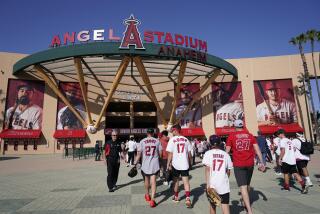Council Members Say City Can’t Afford National Pastime : Lancaster: At $4.7 million to build and $300,000 a year to operate, ex-Angel Doug DeCinces’ proposal for a minor league baseball stadium is considered too costly.
A majority of Lancaster City Council members said Monday that a proposed minor league baseball stadium for the city is too expensive in its current form, citing a consultant’s estimate that the stadium would cost up to $4.7 million to build and $300,000 a year to operate.
“We can’t afford it,” Councilman Arnie Rodio said in an interview. “We are not opposed to baseball coming to Lancaster. We will help in any way that is economically feasible for the city.”
The report on the stadium was released Friday by city officials. In April, the redevelopment agency board--which consists of the five City Council members--commissioned Economics Research Associates of Los Angeles to study the impact of building a municipal stadium for a minor league baseball team proposed by former California Angel Doug DeCinces.
The study concluded that a 3,500-seat baseball stadium would cost the city from $3.6 million to $4.7 million to build and would bring the city about $100,000 in revenues, about a third of the annual operating cost. The 3,000-seat stadium would draw about 100,000 patrons a year, according to the report. A statewide survey found that other minor league baseball teams usually play in stadiums built and subsidized by public money, the report said.
Baseball stadiums should be regarded as “a quality-of-life project, like a theater or a park,” Redevelopment Director Steve Dukett said.
But council members said that, when the stadium was first proposed, they believed that the city’s role would be limited to contributing land for it. The projected cost is excessive, according to Rodio and Councilmen George Theophanis and Henry Hearns, particularly given the economic demands of current projects, including a performing arts center under construction.
“I’m getting concerned at the number of projects that are being subsidized by the city,” Rodio said.
“I share that same thinking,” Hearns said. “However, I am in favor of us allowing the redevelopment agency to invest some money on a onetime basis.”
The councilmen and Rob Venneri of DeCinces’ firm, DeCinces Properties, said they want to discuss the matter further. Venneri said he is eager to hear the opinions of Lancaster residents in addition to the councilmen and said the city involvement outlined by the report is customary for minor league franchises.
“I don’t see a private individual owning a ballpark,” Venneri said. “It’s not a big moneymaker. We knew that going in. . . . If they are talking about giving some money and then the private sector raising the rest, that needs to be addressed to see if it’s even a possibility.”
The stadium issue will probably go to the council members for discussion within the next month, Dukett said.
More to Read
Sign up for Essential California
The most important California stories and recommendations in your inbox every morning.
You may occasionally receive promotional content from the Los Angeles Times.










